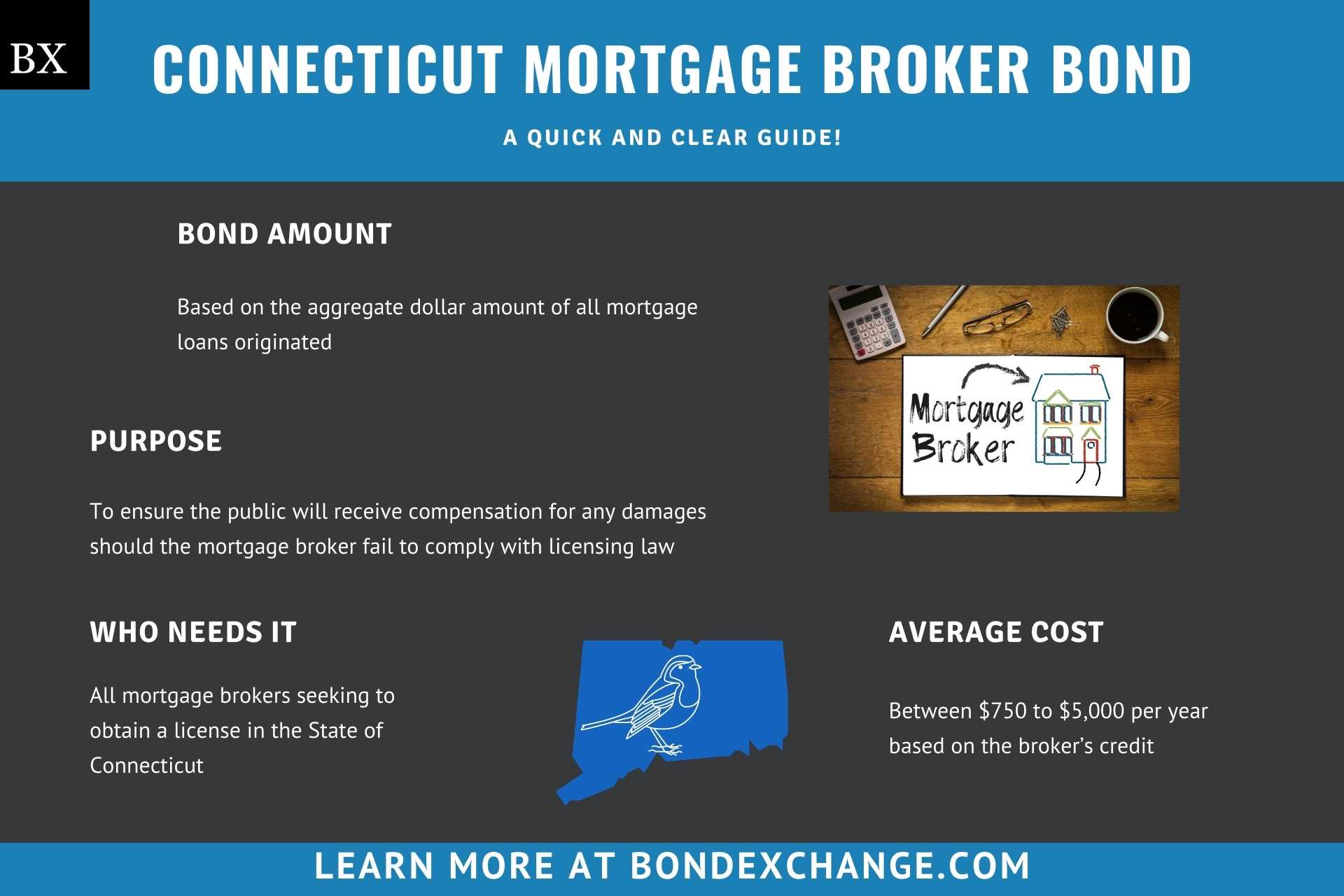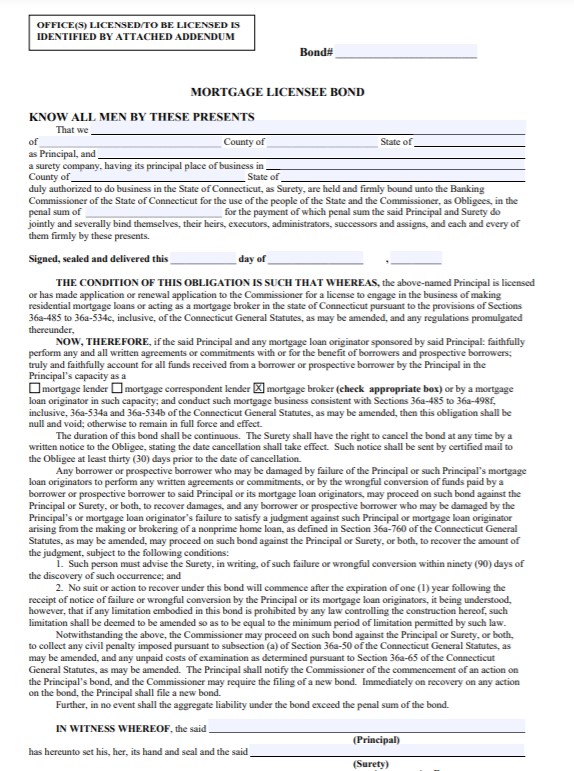Connecticut Mortgage Broker Bond: A Comprehensive Guide
April 8, 2021

This guide provides information for insurance agents to help mortgage brokers obtain Connecticut Mortgage Broker Bonds
At a Glance:
- Average Cost: Between 0.75% to 5% of the bond amount per year based on the broker’s credit
- Bond Amount: Based on the aggregate dollar amount of all mortgage loans originated
Table 1.1
| Dollar Amount of Origination Volume | Bond Amount |
|---|---|
| Less than $30 million | $50,000 |
| $30 million but less than $50 million | $100,000 |
| $50 million or more | $150,000 |
- Who Needs it: All mortgage brokers seeking to obtain a license in the State of Connecticut
- Purpose: To ensure the public will receive compensation for any damages should the mortgage broker fail to comply with licensing law
- Who Regulates Mortgage Brokers in Connecticut: The Connecticut Department of Banking
Background
Connecticut Statute 36a-486 requires all mortgage brokers operating in the state to obtain a license with the Department of Banking. The Connecticut legislature enacted the licensing laws and regulations to ensure that mortgage brokers engage in ethical business practices. In order to provide financial security for the enforcement of the licensing law, mortgage brokers must purchase and maintain a surety bond to be eligible for licensure.
What is the Purpose of the Connecticut Mortgage Broker Bond?
Connecticut requires mortgage brokers to purchase a surety bond as part of the application process to obtain a business license. The bond ensures that the public will receive compensation for financial harm if the broker fails to comply with the licensing regulations. In short, the bond is a type of insurance that protects the public if the broker breaks licensing laws.

How Can an Insurance Agent Obtain a Connecticut Mortgage Broker Surety Bond?
BondExchange makes obtaining a Connecticut Mortgage Broker Bond easy. Simply login to your account and use our keyword search to find the “broker” bond in our database. Don’t have a login? Enroll now and let us help you satisfy your customers’ needs. Our friendly underwriting staff is available by phone (800) 438-1162, email or chat from 7:30 AM to 7:00 PM EST to assist you.
At BondExchange, our 40 years of experience, leading technology, and access to markets ensures that we have the knowledge and resources to provide your clients with fast and friendly service whether obtaining quotes or issuing bonds.
Is a Credit Check Required for the Connecticut Mortgage Broker Bond?
Surety companies will run a credit check on the owners of the mortgage brokerage company to determine eligibility and pricing for the Connecticut Mortgage Broker bond. Broker’s with excellent credit and work experience can expect to receive the best rates. Broker’s with poor credit may be declined by some surety companies or pay higher rates. The credit check is a “soft hit”, meaning that the credit check will not affect the broker’s credit.
How Much Does the Connecticut Mortgage Broker Bond Cost?
The Connecticut Mortgage Broker surety bond can cost anywhere between 0.75% to 5% of the bond amount per year. Insurance companies determine the rate based on a number of factors including your customer’s credit score and experience. The chart below offers a quick reference for the approximate bond cost on a $100,000 bond requirement.
$100,000 Mortgage Broker Bond Cost
Table 1.2
| Credit Score | Bond Cost (1 year) |
|---|---|
| 700+ | $750 |
| 650 – 699 | $1,000 |
| 625 – 649 | $1,250 |
| 600 – 624 | $1,500 |
| 550 – 599 | $3,000 |
| 500 – 549 | $5,000 |
*The credit score ranges do not include other factors that may result in a change to the annual premium offered to your customers, including but not limited to, years of experience and underlying credit factors contained within the business owner’s credit report.
How Does Connecticut Define “Mortgage Broker?”
To paraphrase Connecticut Statute 36a-485, a mortgage broker is any individual or business entity who takes a residential mortgage loan application or offers/negotiates the terms of a residential mortgage loan.
How do Mortgage Brokers Apply for a License in Connecticut?
Mortgage Brokers in Connecticut must navigate several steps to secure their license. Below are the general guidelines, but license applicants should refer to the NMLS’s application guidelines for details on the process.
License Period – The Connecticut Mortgage Broker License expires on December 31 of each year and must be renewed before the expiration date
Step 1 – Meet the Net Worth Requirements
Applicants for the Connecticut Mortgage Broker License must first amass a tangible net worth (assets – liabilities) of at least $50,000. Brokers must submit a completed financial statement verifying their net worth when submitting their license application.
Step 2 – Hire a Qualifying Individual
Mortgage brokers must employ a qualifying individual who is responsible for running the day to day operations of the lending company. Qualifying individuals are subject to both background and credit checks, and must satisfy the following criteria:
-
- Be licensed as a mortgage loan originator with Connecticut
- Hold physical employment at the main office location
- Have at least three years of experience in the mortgage business, within the five years immediately preceding the application
- Reside within 100 miles of the main office or show capability of full time supervision
Qualifying individuals must submit a work experience form verifying their experience.
Step 3 – Purchase a Surety Bond
Mortgage lenders must purchase and maintain a surety bond (limits outlined in Table 1.1)
Step 4 – Request a NMLS Account
The Connecticut Mortgage Broker License application is submitted electronically through the Nationwide Multistate Licensing System (NMLS). To submit a license application, applicants must first request to obtain an NMLS account.
Step 5 – Complete the Application
All Connecticut Mortgage Broker applications can be completed online through the NMLS. Applicants must complete the entire application, and submit the following items:
-
- Financial statements indicating a tangible net worth of at least $50,000
- The following company contacts:
- Primary Company Contact
- Accounting
- Exam Billing
- Licensing
- Consumer Complaint (Public)
- Exam Delivery
- Litigation
- Consumer Complaint (Regulator)
- Legal
- Pre-Exam Contact
- Company formation documents
Mortgage brokers must pay the following fees when submitting their license application
-
- $5,000 registration fee
- $100 NMLS processing fee
- $36.25 background check fee (per person)
- $15 credit report fee (per person)
How Do Connecticut Mortgage Brokers Renew Their License?
Mortgage Brokers can renew their license online through the NMLS. License holders need to simply login to their account to access their renewal application. The Connecticut Mortgage Broker License expires on December 31 of each year and must be renewed before the expiration date.
What Are the Insurance Requirements for the Connecticut Mortgage Broker License?
The State of Connecticut does not require mortgage brokers to obtain any form of liability insurance as a prerequisite to obtaining a business license. Mortgage brokers will need to purchase and maintain a surety bond (limits outlined in Table 1.1).
How Do Connecticut Mortgage Brokers File Their Bond?
Mortgage brokers should submit the completed bond form, including the power of attorney, electronically through the NMLS. Additionally, brokers must mail their completed bond form to the following address:
Department of Banking
260 Constitution Plaza
Hartford CT 06103-1800
The mortgage broker surety bond requires signatures from both the surety company that issues the bond and a representative from the brokerage company. The surety company should include the following information on the bond form:
- Legal name and state/county of entity/individual(s) buying the bond
- Surety company’s name and state/county
- License type (mortgage broker)
- Date the bond is signed
- Witness signatures for both the principal and surety company
What Can Connecticut Mortgage Brokers Do to Avoid Claims Against Their Bond?
In order to avoid claims made against their bond, mortgage brokers in Connecticut must follow all license regulations in the state. Including some of the most important issues below that tend to cause claims:
- Faithfully account for all funds received from borrowers
- Honor all written agreements made with borrowers
What Other Insurance Products Can Agents Offer Mortgage Brokers in Connecticut?
Connecticut does not require mortgage brokers to obtain any form of liability insurance as a prerequisite to obtaining a business license. However, many reputable brokers will seek to obtain this insurance anyway. Bonds are our only business at BondExchange, so we do not issue liability insurance, but our agents often utilize brokers for this specific line of business. A list of brokers in this space can be found here.
How Can Insurance Agents Prospect for Connecticut Mortgage Broker Customers?
The NMLS conveniently provides a public database to search for active mortgage brokers in Connecticut. The database can be accessed here. Contact BondExchange for additional marketing resources. Agents can also leverage our print-mail relationships for discounted mailing services.

